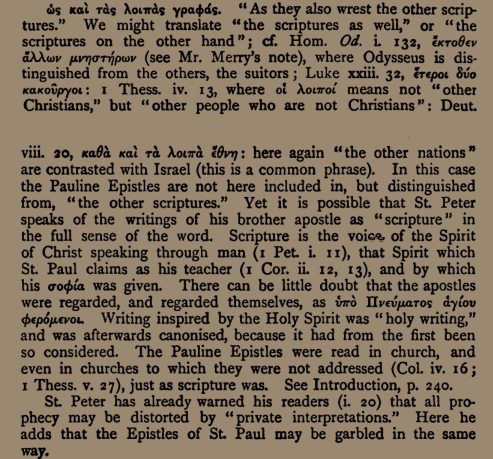The verse 2 Peter 3:16 does not equate the NT scripture with the OT "holy scriptures". Only the latter believers started calling the NT as holy scripture. Two possibilities can be argued in favour of this view.
Firstly, GraphasGraphe does not necessarily mean "holy scripture" or "scriptures of the prophets" (Rom 1:2, 16:26, 2Ti 3:16, Mat 26:56), but scripture or writing in general. Peter's reference in the verse could simply be referring to the writings provided by the Apostles, or simply all writings pertaining to religion, that includes commentaries on the OT as well. Secondly, and this is the stronger argument: the "the rest of" (τὰς λοιπὰς γρ) could also meanshould be translated as "the Scriptures as well" or "the Scriptures on the other hand" as demonstrated by Charles Bigg in 1901. See commentaries:
- Here is the quote from Charles Bigg - A Critical And Exegetical Commentary On The Epistles Of St. Peter And St. Jude, p. 301-302 (1987 edition) (Google preview not available).
BDAG defines loipos as "Pertaining to being one not previously cited or included, other, rest of". The sense of remaining expressed by this word is that of the action has not been taken on this remainder group. This difference of being leftover is the kind of the contrast, it conveys.
Dr. Bigg used only two examples to show loipos means a contrasted-other; something contrasted or newly introduced in context. "But we do not want you to be uninformed, brothers, about those who are asleep, that you may not grieve as others do who have no hope". [1Th 4:13] and τὰ λοιπὰ ἔθνη (the other nations) from Deut 8:20 LXX, which is a common phrase. What others would not have noticed that loipos always means the contrasted rest of group which do not belong in the present category. There is no English equivalent that distinguishes a "contrasted other" like loipos (I am curious to know if other languages do have). The words like 'other, another, rest, remainder' in English means basically the same thing.
The commentators like "Expositor's Greek Testament" are wrong in claiming "but no real parallel to this sense of λοιπός can be found, and the connexion implied in λοιπός is closer than ἄλλος". The connexion with λοιπός is of a changed category, unlike the homogenous type as in ἄλλος. Compare some NT references for loipos.
'God, I thank you that I am not like other men, extortioners, unjust, adulterers, or even like this tax collector. [Luk 18:11 ESV] the rest who are unlike myself.
Do we not have the right to take along a believing wife, as do the other apostles and the brothers of the Lord and Cephas? [1Co 9:5 ESV] as opposed to the other apostles, who are unlike myself.
But we do not want you to be uninformed, brothers, about those who are asleep, that you may not grieve as others do who have no hope. [1Th 4:13 ESV]
So then let us not sleep, as others do, but let us keep awake and be sober. [1Th 5:6 ESV] a contrasted new-group of others
As for those who persist in sin, rebuke them in the presence of all, so that the rest may stand in fear. [1Ti 5:20 ESV] others who don't sin may fear
The rest of the dead did not come to life until the thousand years were ended. This is the first resurrection. [Rev 20:5 ESV]
For what is there in which you were made inferior to the rest of the churches [2 Cor 12:13] a change or contrast of class.
In contrast, allos αλλος means "other" of the same group or entity. Turn the other cheek; I say one servant go, and he goes, another 'come' and he comes; His hand was restored just the other; The other brother; Jesus presented another parable; Whoever marries another woman, etc. There is no contrast of "on the other hand" type, in these references.
The third Greek word is heteros, which means different, strange, of another kind; this another kind is already known or recoverable from the context, it simply means a different one. Ex. No one can serve two masters, he will love one, and hate the other; if they persecute you in one town, flee to another; are you the one or should we look for another one; Then it goes and brings with it seven other/different spirits more evil than itself; “Some say John the Baptist, different/others say Elijah, and different/others Jeremiah or one of the prophets.”
Conclusion:
Besides the argument given by various scholars about the timeline for the epistles, and the concept of a Canon in the Apostolic Church for objecting to the interpretation that Paul's letters are called scriptures, it should also be noted that for the apostles, to call their own writings as "scripture" would've been highly arrogant and inconceivable. The linguistic argument confirms that conclusion by showing that other languages like English do not have the same range of words in Greek, which led to the ambiguity and misinterpretation.
Had Peter used allos in stead of loipos in this verse, it would have meant that he is including the Scriptures in the same group as Paul's writings, showing a very close relationship between them. The word loipos on the other hand means, pertaining to be something of a new group. It means "Scriptures on the other hand, or as well". Given the fact that the English Bible versions & commentators fail to properly translate the scripture by learning basic Greek, we can safely accuse them of presenting inefficient ambiguity, and of even misleading the readers.
